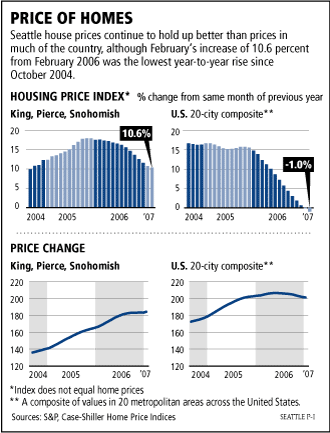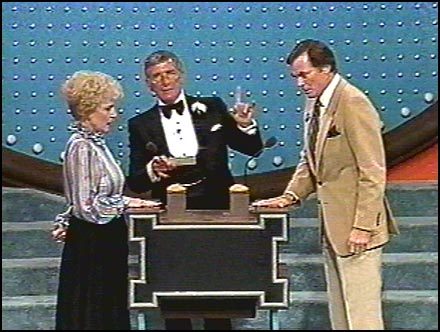Last week Morgan Brown interviewed me for a podcast on his blog, Blown Mortgage. This is my very first podcast and…you can probably tell I was a little nervous at times. Our discussion covered the CMPS designation as well as the current subprime market. To hear our interview, click here.
Is your agent in bed with a title company?
 In the Sunday issue of Seattle Times, Ken Harney addresses the cozy set ups (affiliated business arrangements) that drive up the costs of title insurance. Before I dig into this topic, I thought I’d give you a little bit of title insurance 411.
In the Sunday issue of Seattle Times, Ken Harney addresses the cozy set ups (affiliated business arrangements) that drive up the costs of title insurance. Before I dig into this topic, I thought I’d give you a little bit of title insurance 411.
Title insurance is required by lenders when you purchase or refinance a home. With a purchase, the seller pays for the buyers policy (owners policy) and the buyer pays for the lender’s policy. With a refinance, a new title insurance policy is again issued to insurance a lender for the new mortgage. Unlike other forms our insurance, such as life or auto, a consumer only pays for title insurance when they have a real estate transaction utilizing a mortgage. Most title insurance policies are the same, regardless of which company they are issued from. They are all ALTA policies (American Land Title Insurance Association), typically 1992 Standard or 1998 ALTA which provides additional coverage yet sets deductibles on certain coverages. Expect to pay 10% more for this policy (1998 ALTA) which is most commonly used and is the default on purchase and sale agreement. There are also various amounts of coverage available (standard, extended, etc.). Title insurance rates in Washington State must be approved and filed with the State Insurance Commissioner.
With a purchase, typically, the listing and selling agent negotiate on the purchase and sale agreement who the title insurance and escrow company will be. Currently most title commitments are ordered when the property is listed. Rarely does the consumer have the opportunity to select the title insurance. Even when there is not an “arranged relationship”, real estate agents want to choose “their preferred” title company. When real estate companies have an “affiliated business arrangement” (aba or joint venture), odds are, the consumer will have even less say in where their title insurance will be.
Locally, Coldwell Banker Bain, John L Scott and Windermere have aba’s with LandAmerica Title Insurance Company which operates under Commonwealth of the Pacific and Rainier Title. These companies are required to disclose their interest in the title company by an addendum on the purchase and sale agreement. Most office managers will lean heavily on the real estate agents to use their affiliate title company. In addition, these managers will not allow competing title companies to present materials within their office to their agents even if it is promoting lower rates and fees to the consumer. It is common knowledge within the industry that there is significant incentive for the managers to control this relationship. Other real estate companies have also entered into various marketing agreements with other title companies. Many real estate companies will also try to steer mortgage and escrow for the same reasons (business arrangements).
Ken Harney’s bottom line to consumers it to not “roll over when it comes to title and settlement services. Be aware you can shop for lower-cost alternatives.” One way to have the most significant savings (in Washington state) is to find a title company that offers a 10% discount off the owners policy (this saves the seller money) when using their escrow in conjunction with their title insurance company. The lenders policy (what the buyer pays for) typically varies 5% from company to company. Although there the variance in cost is not huge, the level of service from title companies can vary significantly. It’s been my experience that when the business is arranged (when there is no competition), the service from that title company suffers.
Many consumers want to rely on their real estate agent or mortgage professional to help guide them on selecting a title insurance company. It is important to know exactly what the relationship is between the title company and your agent or lender.
The State Insurance Commissioner is expected to come out within a few weeks with findings of their most recent audit of local title companies along with possible fines…stay tuned!
Mortgage Porter Milestone
I can’t think of a better way to celebrate that I’ve somehow manage to blow past Mortgage Porter’s 100th post than a little song and dance!
Happy Friday!
Blown Interview
Morgan Brown, the blogger behind Blown Mortgage, has recently added podcast interviews on his site. His most recent interview features Tony Gallegos who is an FHA expert. I am very flattered that Tony mentioned Mortgage Porter as one of his favorite blogs. Check out Tony’s interview (not just because of the Mortgage Porter compliment) to learn more about FHA loans. With the correction of the subprime market, FHA loans are on the comeback.
Watch for my interview from Morgan Brown to appear on Blown Mortgage in the near future (I’ll post a link).
Seattle’s Home Prices Buck the National Trend
 The Seattle PI reported yesterday that Seattle home prices are still strong (for now).
The Seattle PI reported yesterday that Seattle home prices are still strong (for now).
"The latest figures, from Standard & Poor’s S&P/Case-Shiller Home Price Indices, show that Seattle-area house prices were up 10.6 percent in February from the same month in 2006 and 0.5 percent from January. Both were the largest increases among the indices’ 20 cities — most of which posted declines year-to-year and month-to-month."
I attribute Seattle bucking the national housing trend to our strong economy and employment. In my opinion, Seattle has been behind in appreciation when you compare our city to other "big cities" in the United States. Another factor is our reduced exposure to foreclosures:
"Statistics from the national Mortgage Bankers Association and RealtyTrac, an Irvine, Calif., company, show that the percentage of subprime loans in Washington — those for borrowers with weak credit — delinquent mortgages and foreclosures are lower in than those for the country as a whole."
What does this mean for home buyers?
-
Be fully equipped with a strong preapproval letter from your Mortgage Professional. You may need to make several offers before landing a signed purchase and sale agreement. Be ready to pounce when a home you’re interested in is available.
-
Try to be flexible with your goals of your next home. Purchasing further out from Seattle or condo may provide you more bang for your buck.
-
If you are considering purchasing a home within the next year, meet with a Mortgage Professional now to review your credit and to develop a plan to be in the best position when you are ready to buy down the road.
Banks Don’t Play By The Same Rules
Thanks to the recent Supreme Court decision, it has been confirmed that mortgage originators who are employed by banks or their subsidiaries, can ignore state licensing requirements that other Mortgage Professionals are required to abide by.
Again…this is nothing new…just a confirmation.
And the Survey Says
 After every closed transaction, I mail my clients a survey to get a read on how they feel their service was from our team. 99% of the time, the responses are very positive.
After every closed transaction, I mail my clients a survey to get a read on how they feel their service was from our team. 99% of the time, the responses are very positive.
In today’s mail, I received two surveys that I thought I would share portions of them with you.
"This was a difficult refinance which seemed hopeless at times but Rhonda never gave up. She was always upfront and honest. Excellent communication and service…I received almost immediate response any time I had a question. Thank you!"
The refinance was challenging however, this mortgage just really made sense to me. I’ll have to follow up with more information in a separate post. Here are some bits from the other survey I received today. This transaction was a purchase that recently closed early.
What did you like best about Mortgage Master:
"Rhonda’s speed & professionalism & dedication"
How could we have improved our service to you:
"Impossible"
Comments:
"Rhonda, you are absolutely the best! Thank you!"
So what about the few who are not satisfied? I’ve had two who did mail in surveys in my seven years who were not singing praises. One was unhappy with the escrow company and I tried to get more details from my client…I do want to know whenever there is room for improvement with the mortgage and home buying process. I did pass that survey on to the escrow company.
The other transaction was with a past client who decided to go elsewhere for his home financing instead of returning to me. Just barely over one week before closing, he changed his mind, pulled his loan from the other lender and threw the transaction in my lap. He withheld an addendum to the purchase and sale agreement with various work orders filling the entire page…you don’t think he was purposely trying to keep that from the lender, do you?
Needless to to say, this delayed the transaction from closing in the one week I was allotted and for that, he was unhappy with me! Had the addendum been provided, we might have closed on time assuming he would have provided the documentation to show the work was complete.
I am glad whenever I receive a survey back from clients. The feedback is priceless and it is my goal to have families as happy with me at the end of the transaction as they were in the beginning.
News Flash
KOMO-4 just interviewed me at my office regarding subprime loans. You can watch the interview tonight during their 6:00 p.m. broadcast.
Update: Here’s a link to the video. Don’t blink…you might miss me!







Recent Comments